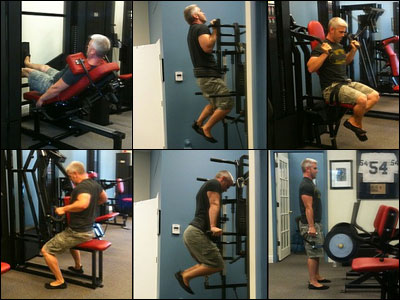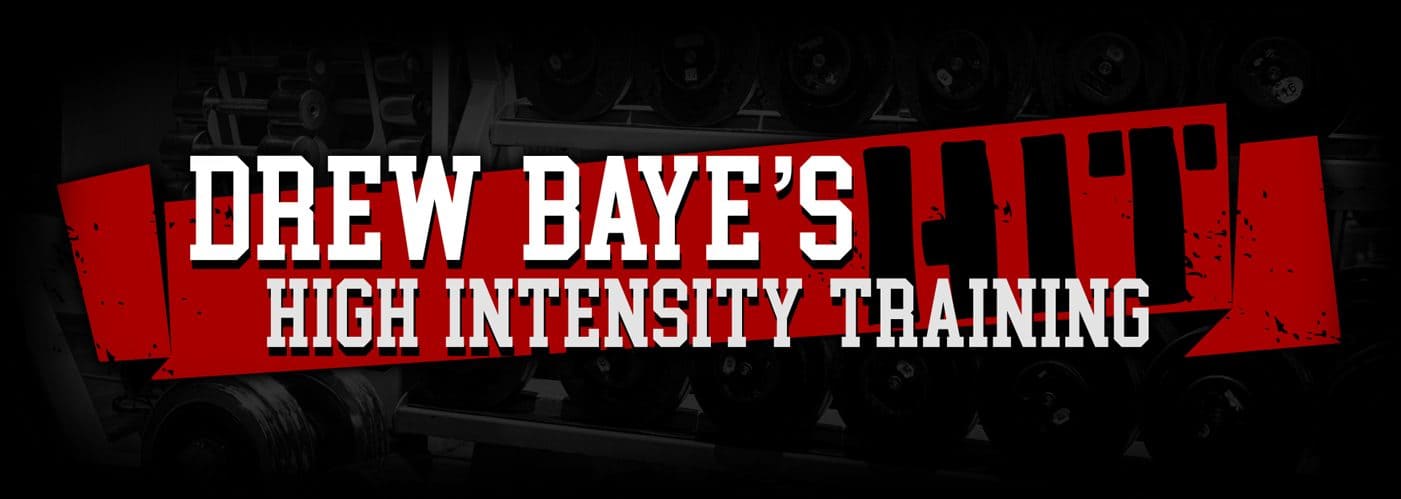Question: I am what you’d probably call “skinny-fat”; I have small arms, legs, shoulders, and chest and want to make them bigger, but at the same time I’m carrying a bit of fat around my middle and want a flat stomach. Can I build muscle and lose fat at the same time or should I work on one at a time? If I can only do one at a time which should I do first?
Answer: It is possible to build muscle mass while losing fat – especially if you are a beginner or restarting after a long time off – but you will not gain muscle as quickly when eating to lose fat. Whether you should focus more on one or the other first depends on which will make the most noticeable improvement in your physique. If your body fat is above average or if you carry a noticeable amount of fat in one area you should focus on leaning down first. To improve your chances of increasing your muscle mass while losing fat instead of just maintaining it you need to do the following:
DON’T eat too little
Have you ever noticed that people with a lot of fat can lose a few pounds a week while people who are lean can take a few weeks to lose a pound? This is because there is a limit to how quickly your body can get energy from your fat stores. The more fat you have, the more energy you can get from it, and vice versa. If you cut your calories too low you won’t be able to put as much effort into your workouts and you won’t get as much out of them because your body won’t be able to recover and adapt as well. Even worse, if your calorie intake is so low your body can’t get all the energy it needs from your fat stores it will start breaking down your muscles for that energy instead.
Start with a slight calorie deficit and reduce it week by week until you are steadily losing fat, but pay close attention to how you feel and keep track of your workouts. If you’re feeling run down or your workout performance is starting to suffer you may want to bring your calories back up. If you’ve got a lot of fat to lose you should aim for a loss of one and a half to two pounds per week. If you’ve only got a small amount to lose aim for one pound per week. If you’re already lean and trying to get even leaner, aim around half a pound per week (For more specific guidelines read Getting Ripped).
DO eat enough protein
When people reduce their calorie intake they often make the mistake of eating less of everything, but you actually benefit from eating more protein when trying to lose fat for a few reasons. First, your body needs adequate protein to effectively recover from the stress of and produce the increases in muscle mass stimulated by high intensity workouts. If you don’t eat enough protein you can actually lose muscle which reduces your metabolic rate and makes it even harder for you to lose fat. Second, it costs your body significantly more energy to digest protein than fat or carbohydrate. The higher the percentage of protein in your diet the lower your net calorie intake after digestion. Third, eating more protein increases hormones that reduce appetite and decreases hormones that increase appetite, making you less hungry while dieting. When eating normally you should try to eat at least 0.7 to 0.8 of protein for every pound of lean body mass you have per day, but when restricting calorie intake for fat loss you should almost double your protein intake to between 1 and 1.4 grams.

To make sure you’re able to get enough protein without exceeding your calorie budget make it the first macronutrient you consider when planning your meals, followed by carbohydrate and fat. If you’re not planning all your daily meals in advance you might find it easier to hit your protein goals if you load up at breakfast, which can also help you feel less hungry for much of your day.
DON’T go too low in carbs
While low carb diets can be effective for losing fat they are not very effective for maintaining much less building muscle even when on a hypercaloric diet because they increase cortisol and AMPk activation (which reduce muscle hypertrophy) while decreasing free testosterone and IGF-1 (which increase muscle hypertrophy). This doesn’t mean you need to go very high in carbohydrate either, but you should aim for at least a moderate carbohydrate intake, or about half of the calories left after subtracting calories from protein. This also helps to better maintain muscle glycogen stores which will allow you to train more intensely.
DO full-body workouts
Full-body workouts are more effective for fat loss than body-part splits for several reasons. First, the more muscle mass worked during your workout the greater the increase in protein turnover and calories burned both during and afterwards. While burning calories is not the primary role of exercise in a fat loss program it does have an effect on long term results. Second, and even more importantly, if you stimulate a muscle to grow it will do so at the expense of other tissues when consume fewer calories than you burn. You want that growth to occur at the expense of your fat, but your body might also take energy from other muscles you are not exercising. Your program should include one or two exercises for all of your muscle groups, and they should be worked as frequently as your recovery ability allows. You are better off spreading the work for a muscle group over several workouts and providing a more frequent stimulus than separating the exercises for muscle groups or body areas into separate less frequent workouts when trying to lose fat.

The most efficient way to do this is to build your workouts around compound (multi-joint, linear) exercises involving many muscle groups and rounding them out with a few simple (single-joint, rotary) exercises for any smaller muscle groups the compound exercises didn’t hit. Ideally, this should include pushing and pulling exercises in both horizontal and vertical planes for the upper body and both squatting and hinging exercises for the lower body (For examples of full-body routines using free weights and/or machines read High Intensity Workouts, and for examples using bodyweight read Project Kratos).
DO get plenty of sleep
Sleep deprivation reduces anabolic hormones like testosterone and growth hormone while increasing cortisol. This makes it harder to lose fat and harder to maintain much less gain muscle mass. When you’re tired it is also harder to maintain the willpower and self-discipline required to stick to your diet and exercise program, and to put your best effort into your workouts. Optimize your sleeping environment by keeping it cool and as dark as possible. Avoid using stimulants like caffeine during the evening. Set up a regular sleep schedule and stick to it, making sure to get to sleep on time so that you wake up every day feeling well rested.
DON’T try to rush it
Be patient and accept that it takes time to lose fat. If you try to rush it by eating too little and/or exercising too much you will lose muscle along with the fat and reduce your metabolic rate. This will only slow down your fat loss in the long run and leave you with less muscle to show when you’re lean.
References:
- Alpert SS. A limit on the energy transfer rate from the human fat store in hypophagia. J Theor Biol. 2005 Mar 7;233(1):1-13.
- Goldberg A. L., Etlinger J. D., Goldspink D. F., Jablecki C. (1975). Mechanism of work-induced hypertrophy of skeletal muscle. Med. Sci. Sports 7, 185–198
- Phillips, S. M., Chevalier, S., & Leidy, H. J. (2016). Protein “requirements” beyond the RDA: Implications for optimizing health 1. Applied Physiology, Nutrition, and Metabolism, 41(999), 1-8.
- Leidy HJ, Clifton PM, Astrup A, et al. The role of protein in weight loss and maintenance. Am J Clin Nutr. 2015;
- Lejeune MP, Westerterp KR, Adam TC, Luscombe-marsh ND, Westerterp-plantenga MS. Ghrelin and glucagon-like peptide 1 concentrations, 24-h satiety, and energy and substrate metabolism during a high-protein diet and measured in a respiration chamber. Am J Clin Nutr. 2006;83(1):89-94.
- Lomenick JP, Melguizo MS, Mitchell SL, Summar ML, Anderson JW. Effects of meals high in carbohydrate, protein, and fat on ghrelin and peptide YY secretion in prepubertal children. J Clin Endocrinol Metab. 2009;94(11):4463-71.
- Blom WA, Lluch A, Stafleu A, et al. Effect of a high-protein breakfast on the postprandial ghrelin response. Am J Clin Nutr. 2006;83(2):211-20.
- Lejeune MP, Westerterp KR, Adam TC, Luscombe-marsh ND, Westerterp-plantenga MS. Ghrelin and glucagon-like peptide 1 concentrations, 24-h satiety, and energy and substrate metabolism during a high-protein diet and measured in a respiration chamber. Am J Clin Nutr. 2006;83(1):89-94.
- Helms ER, Aragon AA, Fitschen PJ. Evidence-based recommendations for natural bodybuilding contest preparation: nutrition and supplementation. J Int Soc Sports Nutr. 2014;11:20.
- Pesta DH, Samuel VT. A high-protein diet for reducing body fat: mechanisms and possible caveats. Nutr Metab (Lond). 2014;11(1):53.
